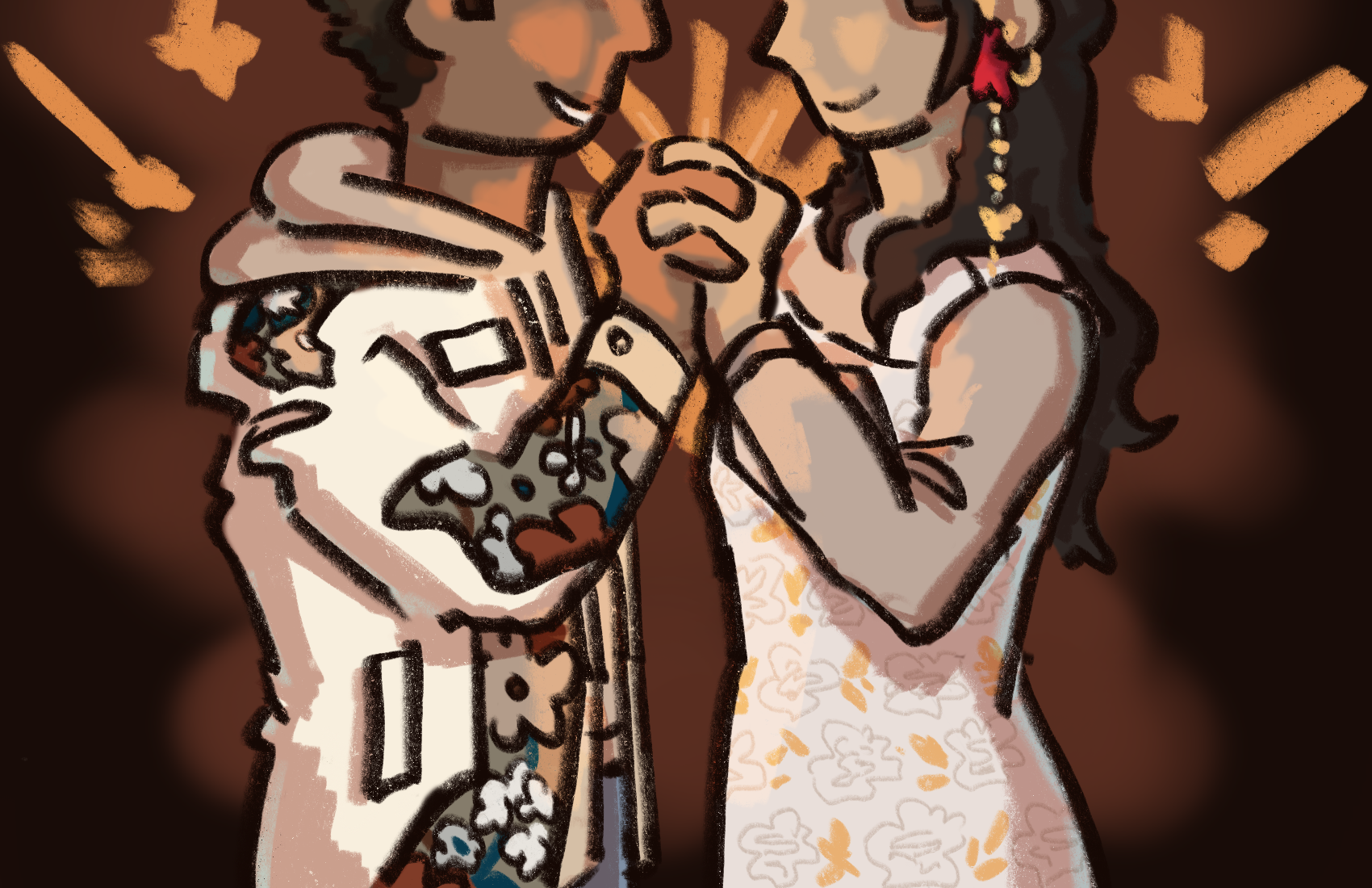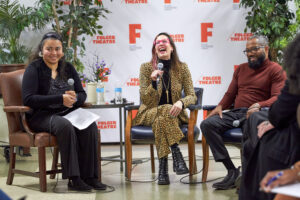In a bold and timely production, Folger Theatre has breathed new life into Shakespeare’s Romeo and Juliet, weaving in modern themes that resonate with the city’s distinct political and cultural landscape.
In Folger Theatre’s adaptation of Romeo and Juliet, politics takes center stage. The production draws stark parallels between the feuding Capulet and Montague families and contemporary political parties. From the moment you enter the theater, you’re immersed in a 2024 political landscape, complete with political speeches in iambic pentameter booming from the speakers while red-clad Capulets and blue-donning Montagues flash across the screens.
As the nation heads into the final days of a rather tumultuous election season, an election season, Karen Ann Daniels, Folger Theatre’s artistic director, emphasizes the connection between the newer generation’s political engagement and their place in shaping the future. “They are beginning to vote, many for the first time, and I think a lot about the future they are deciding, and what may prevent them from fully participating in the democratic process.”
As we approach the play’s opening, the polarization of “red versus blue”—a metaphor for our divided political landscape—takes on a tangible presence onstage. This division of hues spills out onstage in our first views of the actors, accompanied by a mash-up of classical and modern music, which further establishes the new-and-old tone.. The Capulets and Montagues don high-end fashion in their political colors, like baby blue sports coats and blood red high-heels, highlighting the role of wealth and influence in the ongoing feud. Daniels explained that Romeo and Juliet is a cautionary tale, and this production’s story is no different.
While indirect, the costuming tells the story just as much as the actors. “The money, style—all of those work together to let us know who people really are,” Daniels said.
Notable costuming exceptions include the Prince (Deidra LaWan Starnes)and Friar Lawrence (Brandon Carter). As a representative of moral authority, the Prince wears pristine white, while Friar Lawrence, representing the well-meaning but ultimately self-absorbed world, dons a black outfit with a bit of sparkle.
Vice, alongside status and power, is a subtle yet pervasive theme throughout the performance. Romeo constantly drinks from his neon blue flask. Juliet frequently reaches for the cocaine in her necklace. This adaptation of the Shakespearan classic showcases how personal habits cause interpersonal division and isolation.
“All the ways that we polarize ourselves as a culture, all of this plays into this game that creates our political theater,” Daniels said. “It’s very important for us to call it out, you know, name it. That’s theater. That’s performance.”
Another unique element of Folger Theatre’s performance is the choice to make Juliet’s family bilingual—a decision meant to reflect D.C.’s growing diversity. Both Daniels and director Raymond O. Caldwell consider themselves to be “third-culture kids”—people influenced both by their parents’ culture and the culture in which they are raised, creating a unique “third culture” identity. This perspective brings an understanding of cultural fluidity and a sensitivity to diverse backgrounds—something they wanted to acknowledge in Romeo and Juliet, Daniels said. By incorporating bilingualism into Juliet’s family, they honor the range of languages and cultures that make up D.C.’s current population, grounding this classic story in a setting that reflects the city’s vibrant multicultural community.
While this choice adds authenticity to the retelling, the use of captions for non-Spanish speakers could be improved, as they occasionally lagged behind the dialogue and were limited to one or two screens.
In tandem with this push for authenticity, the production’s innovative use of technology—such as the pre-recorded political speeches and AI-generated iambic pentameter—adds another layer of modernity. This approach not only answers how a contemporary Friar Lawrence might fail to reach Romeo, but it also addresses broader conversations around artificial intelligence in the arts. Daniels emphasized that this application of AI is a “healthy example” of its use, not to replace people but to enhance the creative process.
Despite these modern twists on the play, the show’s Romeo (Cole Taylor) and Juliet (Caro Reyes Rivera) are true to a portrayal of the doomed couple in the two spots it matters most: chemistry and naivety. When Reyes Rivera gazes at Taylor perched below her balcony (as she rolls a joint out the window), her giggles bring the thrill of first love to life.
Additionally, Taylor’s acting abilities are in need of extra praise. His panic during each and every fight is so profoundly articulated through his facial expressions and body language; I found myself pitying Romeo in a way I never had before. The inevitability of their tragic fates is underscored by their raw reactions, making their choices feel deeply natural.
Ultimately, this production of Romeo and Juliet proves why Shakespeare’s work remains timeless. By blending the themes of love, power, and fate with contemporary issues of political division and civic engagement, Folger Theatre’s production offers a deeper, more nuanced reflection on the world we live in—and the future we are shaping.
Romeo and Juliet is running at Folger Theatre until Nov. 10 and tickets range from $20-$84, with student discounts available.






